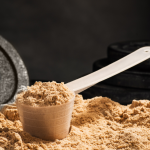Until now, it was assumed that if an athlete’s overall calorie intake does not match their calorie output, they’ll be at risk for developing Relative Energy Deficiency in Sport (RED-S), a condition where performance and health can suffer. But there may be a greater need for carbs for athletes. According to recent findings outlined in Medicine & Science in Sports & Exercise, endurance athletes who consume enough calories but don’t consume enough carbohydrates are still at risk for the condition.
To determine this, a team of researchers from Canada and Australia recruited 28 elite male race walkers and had them complete two 6-day diet and training phases. The first phase was a baseline phase, in which all athletes consumed a high-carbohydrate, high-energy-availability diet. In the second phase, athletes were split into three groups: One group continued to follow a high-carb, high-calorie diet; the other followed a low-carb, high-fat diet (LCHF); and the third group followed a low-energy-availability diet. During both phases, athletes completed a 25K race walk, walking at about 75% of their VO2 max. Blood samples were collected before and after exercise during both phases to measure immune, inflammatory, and iron markers.
Although the phases were very short, the negative effects of an LCHF diet on athletes’ iron levels and their immune and stress responses to exercise were already apparent. In contrast, there were no notable changes to the athlete’s health when following the other two protocols, even for those who followed a low-energy-availability diet. This led the researchers to conclude that dietary restriction of carbs, rather than energy, may have greater negative impacts on health markers in athletes who take part in endurance activities like cycling and running. In other words, bring on the second helping of pasta!

